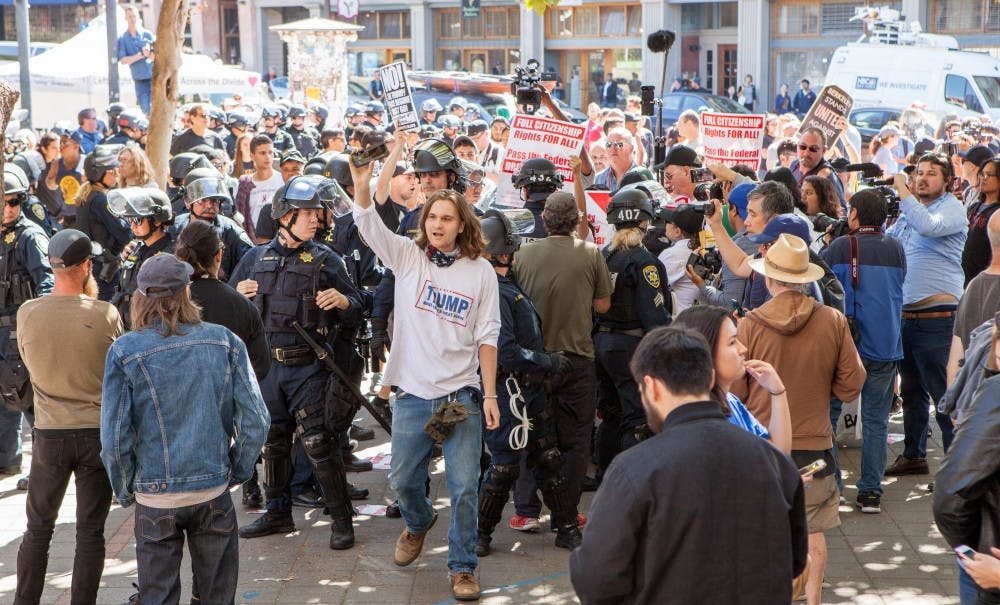There is likely no more contentious sociopolitical issue on college campuses today than free speech, and Princeton is no exception. In terms of institutional policy, at least, the University is decidedly free speech absolutist; accordingly, President Christopher Eisgruber ’83 selected the book “Speak Freely: Why Universities Must Defend Free Speech” by politics professor Keith Whittington as the 2018–19 Pre-read. According to the University, “Speak Freely” “presents a thoughtful examination of free speech and its essential role in the truth-seeking mission of colleges and universities.”
An examination of free speech provoked by works like this year’s Pre-read is surely a healthy exercise for incoming Princetonians. But the broader free speech debate on campus — between supposedly pro-free-speech conservative students and their suppressive liberal peers — is an ideological farce, driven by alt-right figures who are enabled by irresponsible students.
On campuses throughout the United States, some student groups, which claim the label “conservative,” paint their university’s stance on hate speech as a reflection of the school’s broader position on free inquiry and democracy. Hence, they invite heinous ideologues to campus to test their university’s tolerance for expressions of hatred and white supremacy.
The most infamous, oft-cited example of the campus free-speech conflict took place at UC Berkeley last year. In February of 2017, Milo Yiannopoulos, former editor of the alt-right Breitbart News, came to speak at Berkeley per an invitation from the school’s College Republicans organization. But an aggressive protest forced the university to cancel the event. Protesters and school officials claimed Yiannopoulos planned to identify undocumented Berkeley students by name during his anticipated speech; Yiannopoulos denied the charge.
Despite the destruction provoked by Yiannopoulos’s presence and his alleged plan to call out undocumented students, the Berkeley Patriot, a conservative student organization, audaciously invited the alt-right figure back to the school to speak in September 2017 (Yiannopoulos’s second appearance at Berkeley was anti-climatically brief). Defending the invitation, a member of the Berkeley Patriot said to The Daily Californian: “We don’t want to seem like we support someone like Milo, because we don’t. We’re simply inviting him because free speech is protected.”
In other words, this student group, despite not even supporting Yiannopoulos, believed the best way to stand up for academic free speech was to invite back to campus a white supremacist who could have put the lives of undocumented Berkeley students — and others — in jeopardy. If that’s what constitutes free speech to some students, then I want no part in it. As a democratic society, we must condemn and protest speech — no matter how legally protected — that targets people for their identities, citizenship status, and basic humanity. And if the Berkeley Patriot and other conservative student organizations truly believed in free speech, they would spend their time planning events in which they would engage with non-conservative campus groups in a discourse rooted in productive exchange and mutual respect.
Beyond Berkeley’s Yiannopoulos fiasco, other examples of campus free speech strife abound and follow a similar pattern: Conservative students invite an alt-right agitator to speak, liberal students are rightly livid and repulsed, campus officials must achieve the balance between “free speech rights” and basic human decency when deciding whether or not to allow the invitation. And ultimately, the speech offers nothing useful, promotes hatred and bigotry, sows further ideological division, provokes an intense clash between liberal protesters and conservative students, or, in the best cases, is canceled in advance.
Free speech is at once a crucial foundation of a liberal arts, truth-seeking education and a profound moral responsibility. Consequently, I encourage first-year Princetonians to consider this year’s Pre-read and the fundamental importance of free speech on campus — but more importantly, I urge the Class of 2022 to refrain from exploiting free speech as a mechanism of cruelty and hatred.
Samuel Aftel is a junior from East Northport, N.Y. He can be reached at saftel@princeton.edu.









